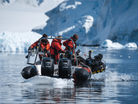P&G Partners with Biotech Start-Up for Cold Wash Technology

Laundry, a seemingly mundane household chore, has a surprisingly large carbon footprint.
Traditional hot water washing consumes substantial amounts of energy, contributing to greenhouse gas emissions.
According to Procter & Gamble (P&G), switching from hot to cold water for laundry can reduce energy use by a staggering 90%.
To put this into perspective, the energy saved from a single cold water wash could power the average American home for more than an hour.
P&G has partnered with bio-AI start-up Basecamp Research to improve cold wash laundry performance using new enzymes.
Dr Philip Souter OBE, Senior Director of Laundry Research and Development at P&G, says: "We are pleased to be partnering with Basecamp Research on this initiative, working together to develop new solutions by combining their unique view of nature and AI capability with our extensive innovation mastery to deliver a superior consumer experience."
Cold water for washing laundry
Despite the clear environmental benefits, many consumers remain sceptical about the efficacy of cold water washing.
There are concerns that lower temperatures may not remove stains, kill bacteria, or activate detergents as effectively as hot water.
This perception has been a significant barrier to widespread adoption of cold water laundry practices.
Enzymes in detergents can target specific stains and dirt without the use of harsh chemicals, but they can be very sensitive to temperature.
Temperatures that are too high could cause enzymes to change shape and stop working, and temperatures that are too cold may mean reactions take too long and laundry isn’t clean by the end of a cycle.
P&G's partnership with Basecamp Research aims to address these concerns head-on by developing innovative enzymes that perform optimally in cold temperatures.
About Basecamp Research
Basecamp Research, a member of the NVIDIA Inception programme for cutting-edge start-ups, brings to the table its proprietary BaseGraph technology.
BaseGraph is a foundational AI dataset powered by the first-ever high-resolution map of global genetic biodiversity.
This sophisticated platform enables the design of novel enzymes and proteins, opening up new possibilities for cold water laundry solutions.
By leveraging Basecamp Research's advanced AI platform, the collaboration seeks to create cleaning enzymes specifically designed for cold water use.
Dr Oliver Vince, Co-Founder of Basecamp Research, explains: "We'll leverage our unparalleled view of the tree of life and our breakthrough AI platform that makes protein design programmable.
“We're excited to partner with leaders in this field and demonstrate a fundamentally different approach."
P&G's commitment to sustainability
This partnership is part of P&G's broader commitment to sustainability.
The company has set an ambitious goal to achieve net-zero emissions across its supply chain and operations by 2040.
P&G has also established short-term sustainability targets for 2030 approved by the Science Based Targets initiative, aligned with limiting global warming to 1.5 degrees Celsius.
Virginie Helias, Chief Sustainability Officer at P&G, says: "We don't have all of the answers on how to bring a net zero future into focus, but we will not let uncertainty hold us back.
“To achieve these goals, we will leverage existing solutions and seek transformative new ones that are not available in the marketplace today.
“This will require partnership across the private, nonprofit and public sectors and involve every aspect of our business, from the very beginning of our products’ lifecycle to the very end.”
******
Receive the next edition of ClimateTech Magazine by signing up for its newsletter.
As part of this portfolio, make sure you check out Sustainability Magazine and also sign up to our global conference series - Sustainability LIVE.
Also check out our Sister Brand, Energy Digital.
*****


